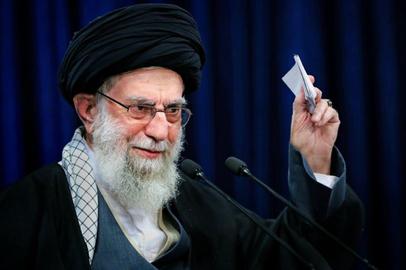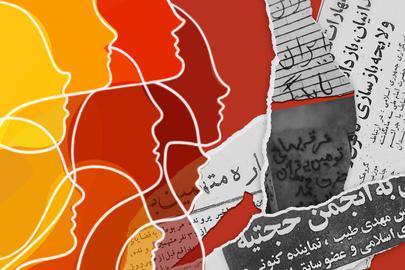By the time Supreme Leader Ayatollah Khamenei announced his approval for Iran to import British and American coronavirus vaccines, it was too late for thousands of families. For those whose loved ones died waiting for a vaccine — people held prisoners to the stubborn arrogance of Khamenei’s misguided policies — it was a bitter moment.
The Supreme Leader made his momentous and tardy decision public on August 11, designating — after almost 18 months of crisis — that the procurement of vaccines was urgent. It was, he said, imperative that vaccines be “made available to all people...whether imported or domestically produced.”
In January, when many countries were beginning to vaccinate their populations, Khamenei banned all vaccines coming from the United States or Britain. "If the Americans had been able to produce the vaccine, they would been able to avoid the coronavirus scandal in their country, where about 4,000 people died in one day. Also, they are essentially untrustworthy, so they produced vaccines to test them on other nations."
According to some tallies, at least 35,000 people have died in recent months due to the Islamic Republic's vaccine shortage. When Khamenei ordered the ban in January, according to official figures from Iran's Ministry of Health and Medical Education, more than 55,000 people had so far died in the country’s Covid-19 crisis. Today, the official number of casualties has exceeded 95,000, based on confirmed cases. However, according to the Ministry of Health, the total number of patients could be three times higher. Iranian Medical Council head Mohammad Reza Zafar Ghandi tweeted on August 8 that the actual number of Covid-19 cases was higher than officially announced, and stated that anyone calling for limits on the number of vaccines to be procured to be held accountable.
Pointing the Finger at the “Father of the Family"
In January, Iran’s Food and Drug Administration chief confirmed the Leader had allowed Pfizer and Moderna vaccines to be imported from “authorized sources” — but not if they had actually been produced in the United States and Britain.
"The Leader of the Islamic Revolution's recommendation to ban the import of the coronavirus vaccine from the United States and Britain is based on extensive scientific research and on his compassion for the people,” said health minister Saeed Namaki in response to criticism, dismissing any fears around the decision.
“Don't make such a fuss," he said. "The father of a family has the right to prohibit the authorities from using a suspicious drug."
Not long after Khamenei’s ban on the vaccine, in February 2021, an Iranian Parliamentary Research Center report stated: "We have to wait to see the effectiveness of different types of vaccines so that the best choice can be made, or wait for the domestic production of a trusted vaccine. This is expected to happen by the spring of 2021."
The Leader’s recent public, televised speech, coupled with other officials’ revelations about the scandal over foreign vaccines, prompted widespread criticism from the public, and from other authorities. Hassan Rouhani's Ministry of Health blamed the Ministry of Foreign Affairs, saying it interfered with the import of vaccines. Mohammad Javad Zarif, foreign minister under Rouhani, took to Twitter to blame the Ministry of Health for the delay.
Outcry From Prominent Figures
As the situation has deteriorated and the controversy has worsened, the clamor of the general public on social media has been added to attacks from a range of institutions and civil society activists, including the vice president of the Bar Association. Many have called for the Attorney General's Office to prosecute the Ministry of Health for its delay in the import of foreign vaccines.
Similar messages came from prominent film directors Jafar Panahi and Mohammad Rasulov, who demanded the Supreme Leader be held accountable for the tragedy of several hundred citizens dying from Covid-19 every single day.
Human rights activist Narges Mohammadi went onto Instagram, leveling responsibility for the murder of Iranian citizens at the Leader. The lack of a strong import policy for foreign vaccines meant he was directly accountable, she said.
Seven lawyers and civil activists were reportedly arrested for their attempts to try key authorities in court for not importing foreign vaccines.
Can the Supreme Leader Really be Held Responsible?
But how is it possible to sue the Leader of the Islamic Republic, Ali Khamenei, for banning the import of British and American vaccines?
Musa Barzin Khalifehlou, a lawyer and legal adviser to IranWire, points to three types of civil, criminal and disciplinary liability applicable to those responsible for the civilian casualties that resulted from the failure to obtain foreign vaccines.
According to him, civil liability falls on the legal entity of governments. Since the institution of government itself cannot face prison sentences or be subjected to other criminal penalties, compensation for civil liability is an available option. In addition, government officials themselves face criminal liability for negligence in performing their duties, and if this responsibility is confirmed, they are liable to face a variety of criminal penalties, including imprisonment. In addition to criminal liability, these officials face disciplinary action and dismissal from public service.
"The analysis of Mr. Khamenei's legal responsibility in this case is complicated," said Barzin Khalifehlou. "This issue must be examined from two perspectives: the civil responsibility of the governments and the criminal responsibility of the officials themselves, including the leader of the Islamic Republic."
A set of general legal principles must be taken into account, he says: "According to the rule, any act or omission of an illegal act that causes harm to a person is liable to compensation, provided that there is a causal relationship between that act and the damage."
According to Iran’s Crisis Management Organization statute, government institutions are responsible for the prevention and handling of a biological crisis such as coronavirus.
Barzin Khalifehlou says the Islamic Republic has a duty to pay compensation to victims. “With earthquakes, it is almost impossible to prevent damage to citizens. Therefore, governments cannot be questioned about such damages. However, in the case of the coronavirus crisis, and given the ban on some vaccines, the responsibility for the loss of life can be explicitly attributed to the government and Mr. Khamenei himself, especially since government officials have spoken out about the opportunity and failure to bring in vaccines and other shortcomings, the legal responsibility of Mr. Khamenei and the government in this case is almost certain."
Responsibility and International Law
In addition to domestic law, the international obligations of states must be taken into account. "Governments have a responsibility to ensure the health and safety of their citizens. The World Health Organization charter also explicitly states that political boundaries should not prevent governments from taking care of citizens' health."
Barzin Khalifehlou says the Supreme Leader’s criminal responsibility stems from the fact that the legal duties of Velayat-e Faqih — the ideology that asserts the dominance of Iran's religious authorities over Iran’s governance — do not explicitly refer to the authorization of the import and export of goods.
He also emphasized the level to which the Supreme Leader has disrupted public health due to the political conflict with the United States.
"Apart from the personal responsibility of the Supreme Leader, government institutions such as the Ministry of Health are not obliged by law to follow the illegal orders of higher authorities. The executive branch and the Ministry of Health itself were legally allowed to disobey the illegal order of the Leader and fulfill their legal duty, which is to ensure the health of the people. Therefore, in this case, the president himself, various officials from the Ministry of Health and every single other official who has failed to provide the vaccine to the people in any way are guilty and must be held accountable in court." As a result, Barzin Khalifehlou says, these officials hold both criminal and disciplinary responsibilities in line with the administrative systems under which they operate.
Filing a complaint about this culpability with the Islamic Republic's judiciary is the right course of action, but there is little chance of it being addressed. IranWire legal counsel says citizens are better placed submitting their reports to the United Nations Special Rapporteur on Iran, which is currently held by Javaid Rahman. He can be contacted through UN channels.
Barzin Khalifehlou advises families who have lost loved ones to continue demanding accountability, through the UN, but also via other activist routes and campaigns. In fact, sharing a video or photo of a loved one who lost their life to the pandemic because they did not have access to the vaccine is a powerful way to express the need for justice, and to help make it possible.
Related Coverage:
Tehran's Covid Tsar Speaks Out on Vaccine Disaster
Fact Check: Are Vaccines Part of America and Britain’s Devious Plans?
Khamenei's Lie and Other Vaccine Myths Iranians Can Safely Ignore
Zarif Apologizes After Khamenei Reprimands Him in Telling Speech
Iran’s Minister of Health: We’ll Soon Be One of Three Top Exporters of Vaccines in the World
visit the accountability section
In this section of Iran Wire, you can contact the officials and launch your campaign for various problems



























comments